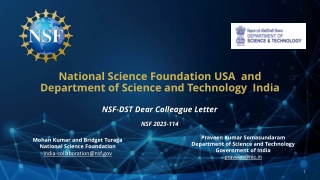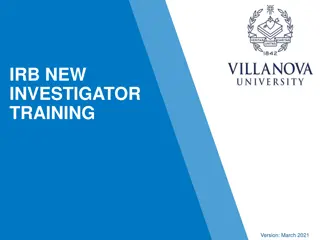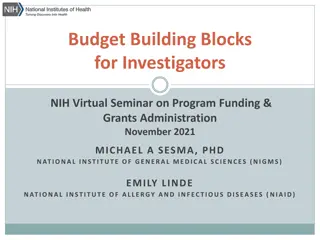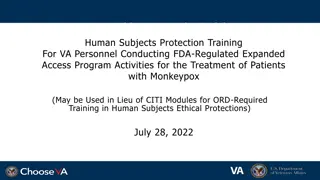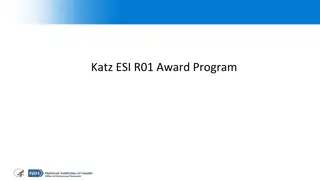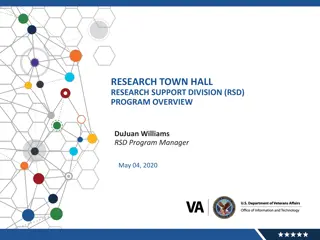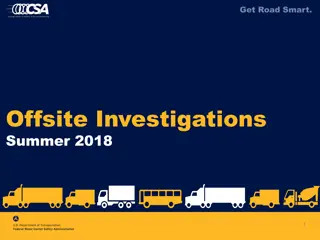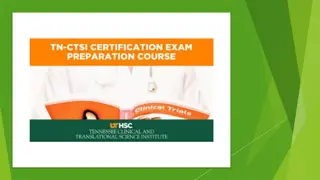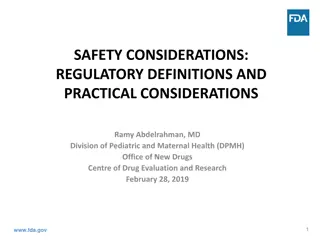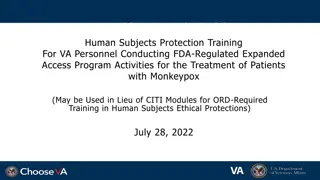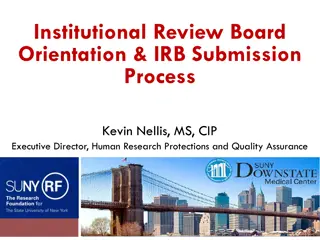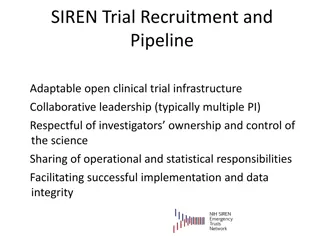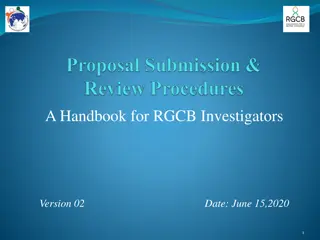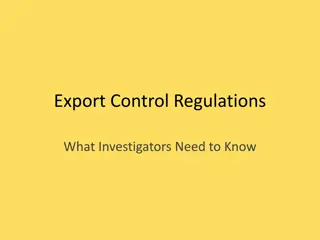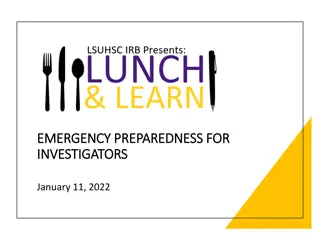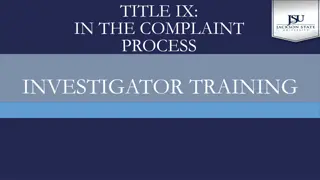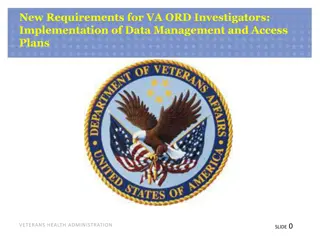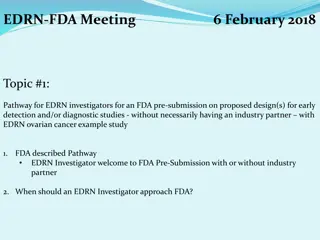National Science Foundation USA and Department of Science and Technology India
Collaborative research opportunity between the U.S. National Science Foundation (NSF) and the Department of Science and Technology (DST) of the Government of India aims to develop new knowledge in computing and communications fields. Investigators from both countries collaborate to write a single pr
3 views • 18 slides
Institutional Review Board Application Process
The basics of the IRB, researcher responsibilities, IRB members, and the role of faculty advisors and student investigators in navigating the IRB application process. Understand the importance of ancillary approvals for research projects involving human subjects.
2 views • 19 slides
BYERS YOUNG INVESTIGATORS RESEARCH CONFERENCE Presentation Guidelines
The BYERS YOUNG INVESTIGATORS RESEARCH CONFERENCE (BYIRC) will be held fully in-person on April 21st, 2023, at Byers Eye Institute in Palo Alto, CA. The event will feature speakers and moderators following specific session formats. Speakers are advised to create presentations tailored to a broad aud
2 views • 12 slides
Early Career Research Funding Opportunities Workshop
Explore various early career research funding opportunities such as ONR YIP, AFOSR YIP, ARO YIP, and DARPA YFA programs during the workshop on Friday, May 5, 2023, from 2 to 4 pm at Morris Library 752. These programs offer substantial grants to support young investigators in advancing basic research
0 views • 17 slides
Blood Spatter Analysis Training Materials - Updated 2023
Learn about bloodstain pattern analysis, types of blood patterns, droplet analysis, and investigative techniques through comprehensive training materials. Explore the significance of blood spatter in crime scene investigations and understand how investigators derive crucial information from blood ev
5 views • 21 slides
Understanding Impression Evidence Collection in Forensic Investigations
Impression evidence plays a crucial role in forensic investigations, with examples including shoeprints, tool marks, tire tracks, bite marks, and riffling marks on bullets. The quality of impressions depends on various factors like the object making the impression, surface conditions, and the materi
1 views • 21 slides
Biological Registration Process and Administrative Controls for Safety Focus
Registering work involving biological materials, toxins, and recombinant DNA is essential for safety compliance. Principal Investigators must follow NIH guidelines and register with the Institutional Biosafety Committee. Contact NIH for additional instructions on working with toxins and Select Agent
5 views • 13 slides
Bloodstain Pattern Analysis: Training Materials and Techniques
Explore the fundamentals of bloodstain pattern analysis through interactive training materials covering topics such as BPA representation, types of blood patterns, droplet analysis, and more. Discover how investigators learn crucial details from blood spatter, including types of injuries, weapon inf
1 views • 21 slides
Understanding NSPM-33: Impact on Federal Research Funding at Indiana University
This content delves into National Security Presidential Memorandum-33 (NSPM-33) and its implications for individuals associated with research and development projects receiving Federal funding at Indiana University. It explains the requirements, standards, and compliance guidelines set forth by NSPM
0 views • 57 slides
Villanova IRB New Investigator Training Overview
Human Subject Research Protections at Villanova IRB, including regulatory background, review process, and key information for investigators. Learn about the Institutional Review Board structure, ethical principles, and historical background of human subjects research at Villanova University.
0 views • 62 slides
NIH Budget Basics for Researchers in Virtual Seminar
The National Institutes of Health (NIH) provides essential information in a virtual seminar on program funding, grants administration, and budget building blocks for investigators. Key topics covered include budget types, components, important considerations, award policy issues, and tips for gettin
0 views • 40 slides
Ethical Protections in Research: Historical Perspectives and Training Objectives
Explore the evolution of ethical protections in research involving human subjects, from key historical events to current regulations governing VA research. Understand the responsibilities of investigators and entities in the approval process, along with pathways for accessing drugs via FDA's Expande
0 views • 25 slides
Federal Sexual Misconduct Laws in Higher Education Overview
The basic structure of federal sexual misconduct laws in higher education is discussed, covering the period from 2011 to 2020. Specific guidance, regulations, and training requirements for Title IX coordinators, investigators, and decision-makers are highlighted. The importance of impartiality, avoi
1 views • 31 slides
Insights into the Katz ESI R01 Award Program
The Katz ESI R01 Award Program, led by Dr. Stephen I. Katz, offers substantial research project awards for Early Stage Investigators without the need for preliminary data. The program emphasizes new research directions and prohibits the use of unpublished data. Applicants must focus on novel approac
0 views • 9 slides
Overcoming Barriers in Medical Education Research
Explore the challenges in conducting research in medical education, emphasizing the importance of evidence-based practices and the need for educators to engage in scholarly activities. Highlighted obstacles include lack of research training, time constraints, and funding issues faced by investigator
0 views • 30 slides
Overview of VA Research Support Division Program
The Research Support Division (RSD) program at the VA focuses on providing guidance and implementing enterprise information security standards for stakeholders involved in research programs. Their mission includes ensuring data security, risk management, and transparency while advancing VA Research.
2 views • 16 slides
Understanding Offsite Investigations in CSA's National Safety Interventions
Offsite Investigations are part of CSA's safety tools, conducted remotely to ensure carrier compliance. Safety Investigators review online documents to diagnose issues and provide corrective actions. Failure to comply may result in penalties or onsite investigations. Offsite Investigations have show
0 views • 7 slides
Investigator Roles and Responsibilities in Clinical Research
Key responsibilities of investigators in clinical research involve ensuring participant safety, compliance with regulations, accurate data collection, and ethical conduct throughout the study process. Properly trained investigators play a crucial role in the success and integrity of clinical trials.
2 views • 81 slides
Understanding Criminal Justice Incentive Pay (CJIP) Program in Florida
The Criminal Justice Incentive Pay (CJIP) Program in Florida, established in 1977 and amended in 1980 and 1981, aims to provide extra salary payments to investigators, law enforcement, and correctional officers for pursuing educational and career development activities beyond job requirements. CJIP
0 views • 12 slides
Safety Considerations and Regulatory Definitions in Drug Evaluation
This presentation by Ramy Abdelrahman, MD, delves into safety considerations, regulatory definitions, and practical responsibilities in drug evaluation. It covers adverse events, suspected adverse reactions, and reporting responsibilities for investigators and sponsors. The content emphasizes making
2 views • 18 slides
Comprehensive Human Subjects Protection Training for VA Personnel
This training addresses the ethical principles and regulations governing VA research involving human subjects, focusing on conducting FDA-regulated Expanded Access Program activities for Monkeypox treatment. It covers historical events shaping research practices, key responsibilities of investigator
0 views • 25 slides
Evolution of Police Methods in Criminal Justice
Traditional police methods in America primarily involved patrol officers and investigators, with a focus on deterrence, crime prevention, and solving crimes. However, proactive policing strategies emerged in the 1990s to address the limitations of traditional methods. Patrol remains a crucial aspect
5 views • 32 slides
Understanding UGA's Human Research Protection Program
The UGA Human Research Protection Program (HRPP) aims to ensure the rights and welfare of research subjects by adhering to ethical and regulatory standards. This program consists of various components such as Institutional Leadership, Human Subjects Office, IRBs, Investigators, and more, with a miss
0 views • 9 slides
The Role of a Coroner in Investigating Unnatural Deaths
The role of a coroner involves investigating deaths under specific circumstances, such as violent or unnatural deaths, unknown causes of death, or deaths in custody. This investigation includes notification, postmortem examinations, and possibly opening an inquest if required criteria are met. The c
0 views • 14 slides
Institutional Review Board (IRB) and Quality Assurance Overview
Institutional Review Board (IRB) plays a crucial role in protecting the rights and welfare of research participants, ensuring the validity, ethics, and compliance of human research. This content covers the functions of IRB as a Privacy Board, distinguishes Downstate and non-Downstate workforce inves
0 views • 27 slides
Investigating Consumer Protection Cases in Malawi
An investigation plan is crucial in handling consumer protection cases in Malawi. This plan aids investigators in staying focused, identifying viable avenues, using resources effectively, anticipating issues, and adhering to set timelines. The process involves receiving complaints or initiating inve
0 views • 14 slides
Streamlined Clinical Trial Infrastructure with Collaborative Leadership
Adaptable and open clinical trial infrastructure emphasizing collaborative leadership with shared responsibilities for successful trial implementation and data integrity. Encourages respectful ownership by investigators while engaging with NIH and SIREN to develop and fund important trials, includin
0 views • 4 slides
Guide for RGCB Investigators: Submission Procedures and Ethics Review
A handbook for RGCB Investigators providing guidelines for submitting research proposals and protocols to the IHEC committee. It includes information on the composition of the EC Regulatory Body, submission procedures, decision processes, and the purpose of EC review to ensure the safety and well-be
1 views • 20 slides
Grant-Funded Reassigned Time Management for Faculty
Faculty members can be reassigned or released from their regular duties to work on grants, with a percentage of their time specified for grant-related activities. This process involves communication between the Office of the Comptroller, analysts, principal investigators, and department chairs to ve
0 views • 11 slides
Understanding Export Control Regulations for Investigators
Export control regulations are in place to limit the transfer of certain technology and equipment to specific countries or individuals for national and economic security reasons. Violations can lead to severe sanctions, making it crucial for investigators to be aware of the complex and changing regu
4 views • 12 slides
Guidance on Continuing Review and Renewals for Research Investigators
This content provides guidance on continuing review and renewal processes required for IRB protocols, outlining the importance of ongoing oversight, key submission information, review schedules, and renewal submission procedures. It emphasizes the need for researchers to adhere to regulatory require
0 views • 19 slides
Icelandic Research Fund 2015: Enhancing Scientific Research and Education
The Icelandic Research Fund (IRF) aims to enhance scientific research and education in Iceland by awarding funding to research projects led by individuals, teams, universities, research institutes, and companies. Principal investigators must have completed graduate studies and experience in running
0 views • 22 slides
Sponsor Expectations for Clinical Studies at Thomas Jefferson University
This presentation discusses the sponsor expectations for clinical studies, investigator responsibilities, TJU's strengths in conducting studies, and how principal investigators can impress sponsors. Topics include assessment of investigator performance, regulatory guidelines, streamlining processes,
0 views • 11 slides
Fusion Science Department Enabling Research Projects 2021-2023
The Fusion Science Department Enabling Research Projects for 2021-2023 focus on developing novel fusion-relevant scientific and technological ideas. These projects, led by Principal Investigators, are distinct from main work packages and involve scientific planning, team collaboration, and resource
0 views • 11 slides
Emergency Preparedness Guidelines for Research Investigators
These guidelines aim to assist research investigators in ensuring the continuity of research operations during emergencies involving drugs and devices. Key actions include obtaining emergency contact numbers, providing emergency cards to participants, securing essential files, communicating with res
0 views • 10 slides
Title IX Complaint Process Investigator Training Overview
This content provides a comprehensive guide to Title IX, including its purpose, procedures, training requirements, and the role of investigators and advisors in the complaint process. It covers the definition of Title IX, the purpose of procedures, the hearing process, and the training requirements
1 views • 47 slides
VA ORD Investigators: Data Management & Access Plans
VA ORD investigators are now required to include a Data Management and Access Plan in their proposals effective January 1, 2016. This plan will be evaluated as part of the scientific peer review process. The requirements include provisions for making final research results public, preserving data, e
0 views • 17 slides
NAF Supported Research Funding Update by Dr. Harry T. Orr, PhD
This update provides insights into the National Ataxia Foundation's mission to support ataxia research by funding new investigators and treatments. It details funded research in 2015 and 2016, including seed grants, SCA pioneer grants, and grants for young investigators. The focus is on fostering ad
0 views • 16 slides
Pathway for EDRN Investigators in FDA Pre-Submission for Early Detection Studies
EDRN investigators can approach the FDA for pre-submission without an industry partner for proposed early detection study designs. The process involves validation, verification, and discovery stages in the biomarker pipeline, utilizing various technologies and biospecimen sets. An example from the o
0 views • 18 slides
Employment Investigations: Title IX Coordinators, Investigators, and Decision Makers
This presentation provides basic information on employment investigations, focusing on the roles and procedures of Title IX Coordinators, Investigators, and Decision Makers. It covers important aspects such as handling formal complaints, mandatory and permissive dismissal criteria, and the philosoph
0 views • 40 slides
